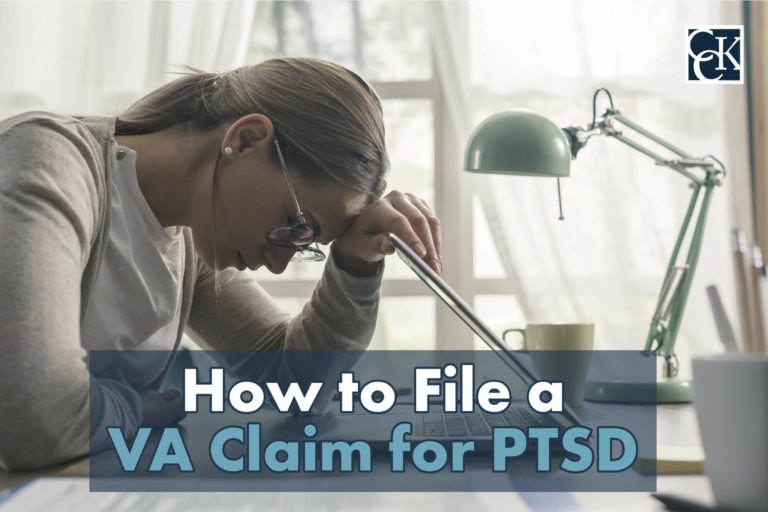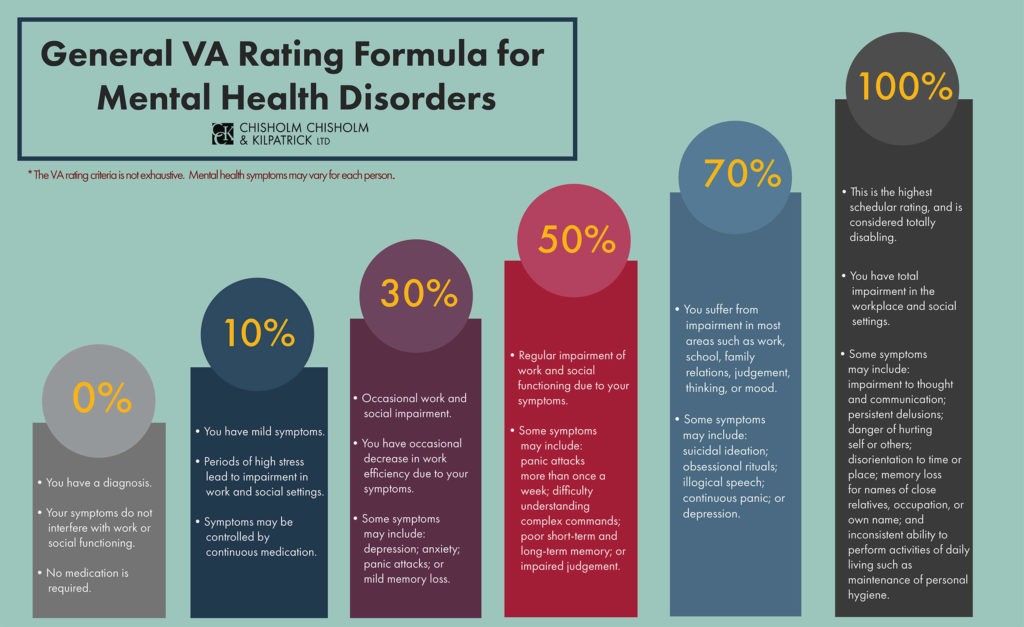How to File a VA Claim for PTSD

CCK Law: Our Vital Role in Veterans Law
Overview of Post-Traumatic Stress Disorder (PTSD)
Post-traumatic stress disorder (PTSD) is a mental health condition that occurs due to experiencing a distressing, shocking, or otherwise traumatic event. Many veterans develop PTSD from events they witnessed or experienced during their military service.
While symptoms and severity of PTSD can vary from person to person, the most common symptoms are:
- Intrusive Thoughts – Those with PTSD may experience repeated, involuntary memories, distressing dreams, or vivid flashbacks of the trauma.
- Avoidance – A person with PTSD may feel moved to avoid people, places, activities, or situations that could trigger memories of their trauma.
- Negative thoughts and feelings – PTSD can cause a person to feel overwhelmed with negative emotions or beliefs about oneself. A person with the condition may also experience feelings of perpetual fear, horror, anger, guilt, or shame. They may feel detached from others and lose interest in activities they previously enjoyed.
- Arousal and reactive symptoms – Those with PTSD may experience irritability and angry outbursts. They may also behave in a reckless or self-destructive way, could be easily started, and may have difficulty concentrating or sleeping.
VA Service Connection for PTSD
Veterans who experienced a distressing or traumatic event during service and have PTSD symptoms as a result may qualify for U.S. Department of Veterans Affairs (VA) disability compensation. To qualify for VA benefits for PTSD, veterans must have evidence of all three of the following things:
- A current diagnosis of PTSD by a medical professional
- An in-service event, injury, or illness that led to PTSD (VA refers to PTSD-causing events as “stressors.” Some examples include exposure to death or injury, the threat of great peril, or assault)
- A medical opinion, or “nexus,” linking the veteran’s current diagnosis (1, above) to the in-service event (2, above)

How to File a VA Disability Claim for PTSD
To get disability compensation, veterans must file a claim with VA. There is an added step with PTSD claims.
- First, veterans should download and fill out VA Form 21-526EZ. This can be submitted via mail to the Claims Intake Center, in person at the closest VA Regional Office, or electronically through VA’s website.
- In addition to the claim form, VA suggests that veterans seeking PTSD benefits also fill out and submit VA Form 21-0781 – Statement in Support of Claimed Mental Health Disorder(s) Due to an In-Service Traumatic Event(s).
What Evidence to Consider for a PTSD VA Claim
VA has a “duty to assist” veterans in developing their claims. This means that VA is required to help gather evidence on their behalf. However, veterans should include or request evidence that might be helpful.
Medical and Service Records
Service personnel records, service medical records, and VA medical records can be highly relevant to a PTSD claim. These can help illustrate when a veteran encountered a stressor, when a veteran began to exhibit symptoms of PTSD, et cetera.
Lay Evidence
Another form of evidence that can be highly useful for PTSD claims is lay evidence, or personal statements written by a veteran or someone familiar with the veteran’s situation (e.g., friends, family, coworkers, etc.).
Lay statements can detail their PTSD symptoms in a lay statement to strengthen their claim for benefits. Lay statements can also be used to fill in gaps and better illustrate the severity of a veteran’s PTSD.
Learn more:
- How to Use Lay Evidence for VA Disability Claims
- How to Write a Strong Statement in Support of Claim for VA Benefits
Compensation and Pension (C&P) Exams
After filing a VA disability claim for PTSD, VA typically schedules the veteran for a compensation and pension (C&P) exam. VA uses C&P exams to determine if a nexus exists. Examiners also use C&P exams to assess the severity of a veteran’s symptoms and decide a disability rating, which determines the amount of monthly compensation (see VA Ratings for PTSD, below).
It is important to go to every scheduled C&P exam, as VA may deny a veteran’s claim if they fail to attend an exam. If a veteran is unable to attend an exam, they should inform VA as soon as possible. If they accidentally miss an exam, they should be sure to contact VA to try to reschedule.
Medical Nexus Letters
While VA may use a C&P exam to determine a nexus for PTSD, veterans can also fulfill this requirement by having a medical professional write a nexus letter for their claim. Nexus letters can be submitted with a veteran’s initial claim, during claim development, or during the appeals process. Nexus letters can also be beneficial if a veteran received a negative C&P exam.
A strong nexus letter should be written by a licensed professional in the appropriate field and reference the veteran’s service medical records, personnel records, and medical history. The nexus letter must also address whether it is “at least as likely as not” that the veteran’s PTSD was incurred during or caused by service and include rationale supporting the determination.
VA Ratings for PTSD
VA ratings determine the amount of monthly compensation and other benefits that VA gives to a veteran.
VA bases PTSD ratings on VA’s General Rating Formula for Mental Disorders, 38 CFR § 4.130, diagnostic code 9411. VA rates PTSD at a 0, 10, 30, 50, 70, or 100 percent. The more severe the symptoms are, the higher the disability rating. Generally, PTSD ratings are based on the level of social and occupational impairment, as well as the frequency, duration, and severity of symptoms.

Did VA Deny Your PTSD Disability Claim?
If you are suffering from PTSD due to your military service, Chisholm Chisholm & Kilpatrick LTD may be able to help you secure the disability benefits you deserve. CCK Law is the leading veterans law firm, with the largest team of VA-accredited representatives of any law firm. Many of the most precedent-setting cases in veterans law were argued by CCK Law attorneys, giving us insights into how the laws and regulations are designed.
Call CCK Law today for a free case evaluation.
About the Author
Share this Post
